简奥斯汀的婚姻观
《傲慢与偏见》中的婚姻观

《傲慢与偏见》中的婚姻观《傲慢与偏见》是英国作家简·奥斯汀的代表作品之一,讲述了英国乡村小康家庭本内特一家的五个女儿在寻找适婚对象的过程中所经历的种种琐事和波折。
在小说中,简·奥斯汀展现了不同人物对婚姻的不同观念和态度,进而探讨了社会对婚姻的重视和影响。
下面我将重点介绍小说中几位主要人物的婚姻观。
贝内特夫妇是小说中最突出的婚姻观代表。
他们对婚姻持有相对理性的态度,并认为婚姻应该建立在彼此相爱的基础上。
贝内特夫妇婚姻观的代表性体现在他们对长女简和丁格莉的婚姻选择上。
他们鼓励简嫁给达西,因为他不仅有钱而且真心爱简。
他们反对丁格莉嫁给柯林斯,因为柯林斯是一个没有个性、只看重社会地位的人,他们认为丁格莉应该嫁给一个真正爱她的人而不是为了追求社会地位而嫁给某个人。
与贝内特夫妇不同,小说中的许多人物对婚姻持有更现实的观念。
他们更注重婚姻的实际利益和社会地位。
达西就是一个明显的例子。
虽然他一开始对简产生了好感,但因为她的社会地位比他低,他在贝内特夫妇的压力下听从了家族利益的安排,娶了安妮·德·伯格作为妻子。
安妮的家族虽然没有达西家族那样的财富,但在社会上的地位很高,这使得达西认为他们的婚姻是一种“合适的”选择。
达西后来对简的了解和对她的真挚感情改变了他对婚姻的观念,并最终与简结为连理。
柯林斯则是一个极端的现实主义者,他完全不在乎婚姻的感情和真爱,只注重自己的社会地位和利益。
他不断向贝内特夫妇的女儿们求婚,不是因为他们有吸引力或他们爱他,而是因为他们的社会地位高,这符合他个人的利益。
在约会丁格莉后,柯林斯又迅速转投简,因为简的社会地位在丁格莉之上。
尽管柯林斯的婚姻观与其他人的观念相悖,但在现实社会中,这样的婚姻观念并非罕见。
在小说中,简·奥斯汀不仅描绘了不同人物的婚姻观念,还对社会对婚姻的塑造和影响进行了描述。
她展示了社会对婚姻的高度重视,同时呈现了社会舆论对个人婚姻选择的压力和干预。
《傲慢与偏见》中的婚姻观

《傲慢与偏见》中的婚姻观《傲慢与偏见》是英国作家简·奥斯汀的代表作之一,作品通过描写伊丽莎白·班内特与菲茨威廉·达西之间的爱情故事,展现了作者对当时英国上层社会的婚姻观念的批判。
婚姻在这部小说中被视为一种社会交往方式,同时也是个人追求幸福的重要途径。
小说中展现了当时英国上层社会注重门当户对的婚姻观念。
伊丽莎白的母亲,班内特夫人,为了女儿们的婚姻大事而着急,坚持认为女儿们应该选择同等社会地位的丈夫。
她并不认同伊丽莎白与达西的爱情,认为达西的高贵身份与普通人家不相称。
这种婚姻观念反映了当时社会对于门当户对的看重,社会地位高低决定了一个人的价值和地位。
作者通过伊丽莎白和达西的爱情成功地颠覆了这种观念,表明爱情可以超越社会地位的局限。
小说中也暗示了女性在婚姻中的被动地位。
在当时的社会中,女性的婚姻多由家庭决定,女性没有选择权。
班内特姐妹们的婚姻都是受家庭安排的结果,而他们的母亲更是希望女儿们都可以尽早结婚。
作者通过伊丽莎白对于婚姻的态度以及她与达西的爱情故事,呼吁女性应该有权利选择自己的幸福。
伊丽莎白坚持选择她自己认可的伴侣,而不是为了社会地位或者金钱而放弃自己的幸福。
通过塑造伊丽莎白这样的女性形象,作者展现了对当时社会对女性的束缚和压迫的批判。
小说中还揭示了婚姻与财富之间的紧密联系。
在小说中,许多人对婚姻有着纯粹的功利观念,比如吉尔范夫人就为了嫁个有钱人而奋斗。
小说中的女性们也纷纷将婚姻看作是获取财富和社会地位的手段。
作者也通过伊丽莎白和达西的故事,告诉读者金钱并不是幸福的唯一标准。
伊丽莎白与达西最终走到一起,并不是因为达西的财富,而是因为他们的共同价值观和互相吸引。
通过这样的描写,作者批判了婚姻中纯粹的物质追求和功利观念。
《傲慢与偏见》中的婚姻观是对当时英国上层社会婚姻观念的批判。
作者通过展示伊丽莎白和达西的爱情故事,表达了女性应该有权利选择自己的幸福,不应该被束缚于社会地位和物质追求。
简奥斯汀婚恋观开题报告

简奥斯汀婚恋观开题报告简奥斯汀婚恋观开题报告简奥斯汀是英国文学史上备受推崇的作家之一,她的作品以细腻的描写、深入的人物刻画和独特的婚恋观而闻名。
本文将探讨简奥斯汀的婚恋观,分析其对当时社会和现代社会的影响。
首先,简奥斯汀的作品中常常出现的主题是婚姻。
她对婚姻的描写并非简单地将其视为一种社会习俗,而是通过对人物内心世界的剖析,展现了婚姻的复杂性。
她关注的是婚姻的真实性和情感的真实性,而非仅仅追求金钱或地位。
这种观点在当时的社会中并不常见,因为大多数人的婚姻是由家庭安排的,目的是为了提高社会地位或财富。
简奥斯汀的作品中的婚姻观念对当时社会的婚姻观产生了积极的影响,也为后来的婚姻观念奠定了基础。
其次,简奥斯汀的作品中的婚姻观也对现代社会产生了深远的影响。
她强调婚姻应该建立在相互尊重和真实感情的基础上,而不是仅仅出于物质或社会地位的考虑。
这种观念在现代社会中仍然具有重要意义。
随着社会的发展,人们对婚姻的期望也发生了变化。
婚姻不再仅仅是一种经济合作关系,而是更多地关注个人的幸福和情感需求。
简奥斯汀的作品中的婚姻观念为现代社会提供了一个重要的参考,引导人们更加注重婚姻的质量而非数量。
另外,简奥斯汀的作品中的婚姻观也反映了当时社会对女性的限制和期望。
在19世纪的英国社会,女性的地位相对较低,婚姻被视为她们唯一的出路。
然而,简奥斯汀通过她的作品,展现了女性的智慧和独立性格。
她的女性角色通常是聪明、有主见和有追求的。
她们不仅仅是被动的婚姻对象,而是有能力选择自己的伴侣和生活方式。
这种对女性的赋权观念对当时的社会产生了积极的影响,也为后来的女性解放运动提供了启示。
简奥斯汀的婚恋观在当时和现代社会都具有重要意义。
她通过细腻的描写和深入的人物刻画,展现了婚姻的复杂性和情感的真实性。
她强调婚姻应该建立在相互尊重和真实感情的基础上,而不是仅仅出于物质或社会地位的考虑。
她的作品还反映了当时社会对女性的限制和期望,通过赋予女性智慧和独立性格,为女性解放运动提供了启示。
简·奥斯丁婚姻观与当代女大学生恋爱观思考

简·奥斯丁婚姻观与当代女大学生恋爱观思考简·奥斯丁是英国文学史上的一位伟大女作家,她的作品以描写英国乡村社会为主,通过对人物内心感情的细腻刻画,展现了当时英国社会内部的伦理道德观念和婚姻观念。
奥斯丁笔下的女性形象,智慧、独立、追求真爱,不愿妥协自己的幸福,对婚姻有着自己独到的见解。
随着社会的不断发展和时代的变迁,当代女大学生的恋爱观也在逐渐发生变化。
奥斯丁的婚姻观与当代女大学生的恋爱观有何异同?这是一个值得我们深入探讨的问题。
简·奥斯丁的婚姻观主要体现在她的小说作品中。
她笔下的女性主角,如《傲慢与偏见》中的伊丽莎白、《理智与情感》中的艾玛等,都是拥有独立思想和自主意识的女性形象。
奥斯丁所描述的婚姻,并非简单地将女性视作男性的附属品,而是看重两性之间的平等和尊重。
奥斯丁认为,婚姻应该建立在相互尊重和真爱的基础之上,而不是仅仅为了物质利益或社会地位而结合。
她希望女性能够通过婚姻实现自己的人生价值,并不断追求自己的幸福。
当代女大学生的恋爱观念和奥斯丁笔下的女性形象有所不同。
随着社会的开放和人们的观念逐渐更新,当代女大学生更加注重个人的价值和自由,追求的不仅仅是稳定的婚姻生活,更希望能够在感情中找到真正的爱情和激情。
她们更加注重自己的内心感受和生活品质,不愿意因为社会压力或家庭期望而妥协自己的幸福。
在选择伴侣时,她们更倾向于寻找与自己志趣相投、拥有相似人生观和价值观的伴侣,追求的是一种更为平等和包容的婚姻关系。
当代女大学生的恋爱观与奥斯丁的婚姻观存在一定的联系,即追求真爱、崇尚平等和自主。
也存在一些不同之处,即对婚姻关系更加看重自由和独立,注重个人的价值观和感受。
面对这样的情况,我们不禁要问,当代女大学生的恋爱观中是否存在着一些问题?是否应该更多地借鉴奥斯丁的婚姻观念呢?或者,她们所追求的自由和独立,是否值得我们深思和探讨呢?我们可以从奥斯丁的婚姻观中找到一些值得当代女大学生借鉴的地方。
简·奥斯汀的爱情观与社会风尚

简·奥斯汀的爱情观与社会风尚简·奥斯汀简介简·奥斯汀(Jane Austen)是英国19世纪著名小说家,以其独特的写作风格和深入描绘女性角色而闻名于世。
她的作品多以爱情婚姻为线索,通过剖析当时英国上层社会的社交规则和道德观念,展现了女性在那个时代所面对的激动人心而又曲折复杂的恋爱关系。
文化背景与社会风尚在奥斯汀所生活的18-19世纪英国,上层社会被确定、传统、保守的价值观所主导。
阶级分明、礼仪荣耀至上、经济地位及血统显赫等成为人们评价一个人身份的重要标志。
这种文化背景下,恋爱婚姻变得复杂并充满了挑战。
奥斯汀作品中的爱情观1.自由婚姻与利益婚姻:奥斯汀强调自由选择配偶和真爱之间关系的重要性。
她的小说角色常常面临财富、地位与真爱之间的选择,通过展示自由婚姻与利益婚姻背后的种种复杂因素,揭示了其中存在的困境和挑战。
2.真实与虚荣:奥斯汀作品中,女性角色具备独立思考和判断能力,并更注重内在品质而非外貌和财富。
奥斯汀倡导真实与坦诚的感情交流,并强调不应受到外界追求名誉和虚荣心所左右。
3.社交规则和约束:社交礼仪对于英国上层社会至关重要,而奥斯汀在作品中赋予了社交规则以极大的意义。
角色们必须懂得适时、适度地表现出自己,在这种环境下进行细致入微的恋爱游戏。
对当代社会的启示简·奥斯汀作品中呈现出来的爱情观念和社会风尚仍然对当代社会有着一定程度的启示: 1. 真爱价值:不受外界干扰,通过深入了解并相互支持与尊重,可以找到真正的幸福。
2. 自主选择:坚持自己的价值观和理想,不被社会规范与他人眼光左右。
3. 诚实沟通:避免虚伪和欺骗,保持诚实而开放的沟通方式。
简·奥斯汀通过其小说作品中所揭示的爱情观与社会风尚,成功地展示了个人自由、内心追求和家庭责任之间微妙的平衡关系,并为当代读者提供了对于恋爱和婚姻的思考。
她独特细腻而又幽默的写作风格,使得她成为文学史上备受推崇的作家之一。
《傲慢与偏见》中的婚姻观
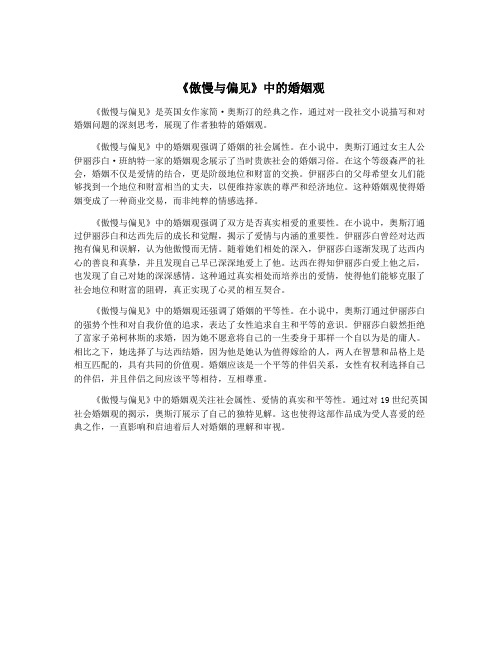
《傲慢与偏见》中的婚姻观《傲慢与偏见》是英国女作家简·奥斯汀的经典之作,通过对一段社交小说描写和对婚姻问题的深刻思考,展现了作者独特的婚姻观。
《傲慢与偏见》中的婚姻观强调了婚姻的社会属性。
在小说中,奥斯汀通过女主人公伊丽莎白·班纳特一家的婚姻观念展示了当时贵族社会的婚姻习俗。
在这个等级森严的社会,婚姻不仅是爱情的结合,更是阶级地位和财富的交换。
伊丽莎白的父母希望女儿们能够找到一个地位和财富相当的丈夫,以便维持家族的尊严和经济地位。
这种婚姻观使得婚姻变成了一种商业交易,而非纯粹的情感选择。
《傲慢与偏见》中的婚姻观强调了双方是否真实相爱的重要性。
在小说中,奥斯汀通过伊丽莎白和达西先后的成长和觉醒,揭示了爱情与内涵的重要性。
伊丽莎白曾经对达西抱有偏见和误解,认为他傲慢而无情。
随着她们相处的深入,伊丽莎白逐渐发现了达西内心的善良和真挚,并且发现自己早已深深地爱上了他。
达西在得知伊丽莎白爱上他之后,也发现了自己对她的深深感情。
这种通过真实相处而培养出的爱情,使得他们能够克服了社会地位和财富的阻碍,真正实现了心灵的相互契合。
《傲慢与偏见》中的婚姻观还强调了婚姻的平等性。
在小说中,奥斯汀通过伊丽莎白的强势个性和对自我价值的追求,表达了女性追求自主和平等的意识。
伊丽莎白毅然拒绝了富家子弟柯林斯的求婚,因为她不愿意将自己的一生委身于那样一个自以为是的庸人。
相比之下,她选择了与达西结婚,因为他是她认为值得嫁给的人,两人在智慧和品格上是相互匹配的,具有共同的价值观。
婚姻应该是一个平等的伴侣关系,女性有权利选择自己的伴侣,并且伴侣之间应该平等相待,互相尊重。
《傲慢与偏见》中的婚姻观关注社会属性、爱情的真实和平等性。
通过对19世纪英国社会婚姻观的揭示,奥斯汀展示了自己的独特见解。
这也使得这部作品成为受人喜爱的经典之作,一直影响和启迪着后人对婚姻的理解和审视。
简析简奥斯汀的婚姻观及其启示_《傲慢与偏见》
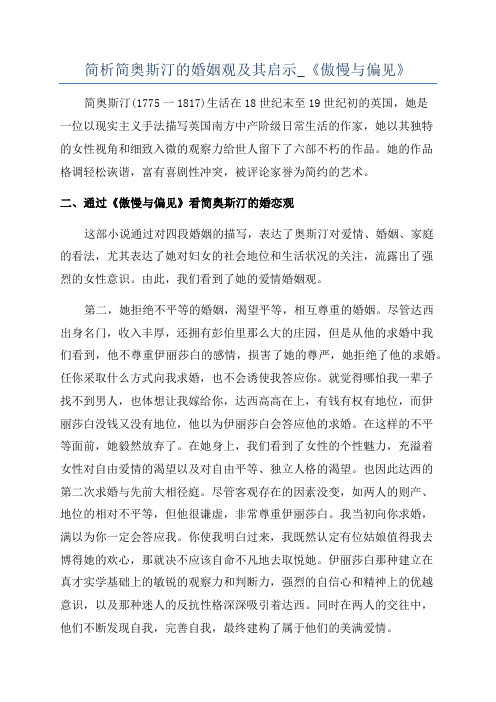
简析简奥斯汀的婚姻观及其启示_《傲慢与偏见》简奥斯汀(1775一1817)生活在18世纪末至19世纪初的英国,她是一位以现实主义手法描写英国南方中产阶级日常生活的作家,她以其独特的女性视角和细致入微的观察力给世人留下了六部不朽的作品。
她的作品格调轻松诙谐,富有喜剧性冲突,被评论家誉为简约的艺术。
二、通过《傲慢与偏见》看简奥斯汀的婚恋观这部小说通过对四段婚姻的描写,表达了奥斯汀对爱情、婚姻、家庭的看法,尤其表达了她对妇女的社会地位和生活状况的关注,流露出了强烈的女性意识。
由此,我们看到了她的爱情婚姻观。
第二,她拒绝不平等的婚姻,渴望平等,相互尊重的婚姻。
尽管达西出身名门,收入丰厚,还拥有彭伯里那么大的庄园,但是从他的求婚中我们看到,他不尊重伊丽莎白的感情,损害了她的尊严,她拒绝了他的求婚。
任你采取什么方式向我求婚,也不会诱使我答应你。
就觉得哪怕我一辈子找不到男人,也体想让我嫁给你,达西高高在上,有钱有权有地位,而伊丽莎白没钱又没有地位,他以为伊丽莎白会答应他的求婚。
在这样的不平等面前,她毅然放弃了。
在她身上,我们看到了女性的个性魅力,充溢着女性对自由爱情的渴望以及对自由平等、独立人格的渴望。
也因此达西的第二次求婚与先前大相径庭。
尽管客观存在的因素没变,如两人的则产、地位的相对不平等,但他很谦虚,非常尊重伊丽莎白。
我当初向你求婚,满以为你一定会答应我。
你使我明白过来,我既然认定有位姑娘值得我去博得她的欢心,那就决不应该自命不凡地去取悦她。
伊丽莎白那种建立在真才实学基础上的敏锐的观察力和判断力,强烈的自信心和精神上的优越意识,以及那种迷人的反抗性格深深吸引着达西。
同时在两人的交往中,他们不断发现自我,完善自我,最终建构了属于他们的美满爱情。
第三,她拒绝非理性的婚姻,崇尚感性与理性并存的婚姻。
伊丽莎白在没有爱上达西前,她也爱过威克姆。
伊丽莎白觉得无论是上次见到他的时候,还是以后想起他的时候《傲慢与偏见》,她丝毫没有错爱他。
浅析简奥斯汀在《傲慢与偏见》中的婚姻观

浅析简·奥斯汀在《傲慢与偏见》中的婚姻观摘要:小说《傲慢与偏见》中简·奥斯汀通过对四种不同的婚姻描述,反映了奥斯汀的爱情观和婚姻观:以物质或情欲为基础的婚姻是不会幸福的,幸福理想的婚姻应该是以爱情为基础,并考虑经济因素,启发我们现代人如何正确对待爱情和婚姻。
关键词:《傲慢与偏见》;简·奥斯汀;婚姻观一、引言《傲慢与偏见》原名《最初的印象》,是18世纪末19世纪初英国现实主义女作家简·奥斯汀的代表作。
她一生共创作了六部以婚姻为主题的长篇小说,其中《傲慢与偏见》被认为是最具代表性一部。
在这部小说中,婚姻问题始终贯于各种社会与经济关系中,中产阶级贝纳特夫妇共育有五个女儿,依据英国当时的财产限嗣继承法,贝纳特先生的财产由其远房亲戚柯斯林继承。
这样五个女儿没有了经济来源,失去了原有的优越生活,贝纳特夫人迫不及待地想让五个女儿都有机会嫁给有钱人,进入上流社会,从而产生了四桩婚姻。
作品以男主人公达西和女主人公伊丽莎白的爱情故事为主线,描写了贵族青年达西喜欢上了班纳特家的二小姐伊丽莎白,他的朋友彬格莱则钟情于大女儿吉英。
这两对青年的婚姻经过多重波折,最终过上了幸福的生活。
小说还涉及了另外两对青年男女的婚姻,伊丽莎白的女友夏绿蒂嫁给了有钱人柯斯林;放荡的莉迪亚与奸诈下流的韦翰私奔后在达西的帮助下促成的婚姻。
小说通过描绘“乡镇上的三四户人家”日常生活,用细腻的手法描述了婚姻现象和本质,并深刻地分析了乡镇中产阶级家庭出身的少女们对婚姻问题的不同态度,表达了她对建立在相互理解相互尊重的婚姻的赞同。
下面试对四对青年男女的婚姻进行具体分析,阐述简·奥斯汀的婚姻观。
二、《傲慢与偏见》中四桩不同的婚姻(一)夏绿蒂与柯林斯夏绿蒂是伊丽莎白的好友,头脑聪明,接受过良好的教育,但其家底并不丰厚,也没有精致漂亮的外貌,作为一名27岁的大龄未婚女性,婚姻一直是她的目标,"大凡家挺不好而又受过相当教育的青年女子总是把结果当作仅有的一条体面的退路。
《成为简·奥斯汀》的婚姻观浅析.doc
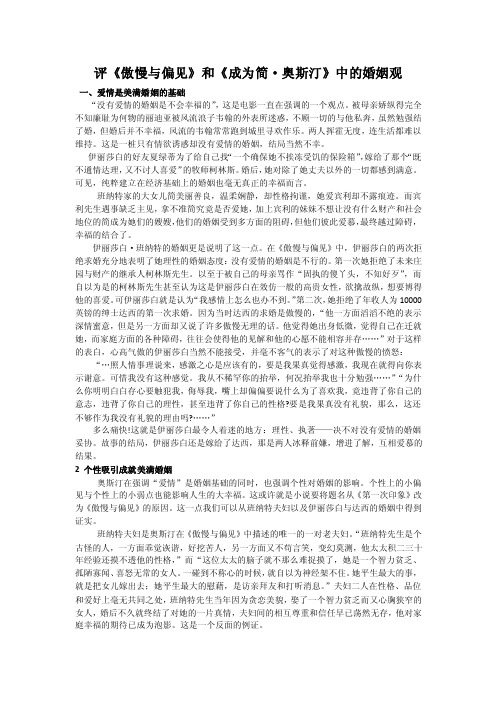
评《傲慢与偏见》和《成为简·奥斯汀》中的婚姻观一、爱情是美满婚姻的基础“没有爱情的婚姻是不会幸福的”,这是电影一直在强调的一个观点。
被母亲娇纵得完全不知廉耻为何物的丽迪亚被风流浪子韦翰的外表所迷惑,不顾一切的与他私奔,虽然勉强结了婚,但婚后并不幸福,风流的韦翰常常跑到城里寻欢作乐。
两人挥霍无度,连生活都难以维持。
这是一桩只有情欲诱惑却没有爱情的婚姻,结局当然不幸。
伊丽莎白的好友夏绿蒂为了给自己找“一个确保她不挨冻受饥的保险箱”,嫁给了那个“既不通情达理,又不讨人喜爱”的牧师柯林斯。
婚后,她对除了她丈夫以外的一切都感到满意。
可见,纯粹建立在经济基础上的婚姻也毫无真正的幸福而言。
班纳特家的大女儿简美丽善良,温柔娴静,却性格拘谨,她爱宾利却不露痕迹。
而宾利先生遇事缺乏主见,拿不准简究竟是否爱她,加上宾利的妹妹不想让没有什么财产和社会地位的简成为她们的嫂嫂,他们的婚姻受到多方面的阻碍,但他们彼此爱慕,最终越过障碍,幸福的结合了。
伊丽莎白·班纳特的婚姻更是说明了这一点。
在《傲慢与偏见》中,伊丽莎白的两次拒绝求婚充分地表明了她理性的婚姻态度:没有爱情的婚姻是不行的。
第一次她拒绝了未来庄园与财产的继承人柯林斯先生。
以至于被自己的母亲骂作“固执的傻丫头,不知好歹”,而自以为是的柯林斯先生甚至认为这是伊丽莎白在效仿一般的高贵女性,欲擒故纵,想要博得他的喜爱。
可伊丽莎白就是认为“我感情上怎么也办不到。
”第二次,她拒绝了年收人为10000英镑的绅士达西的第一次求婚。
因为当时达西的求婚是傲慢的,“他一方面滔滔不绝的表示深情蜜意,但是另一方面却又说了许多傲慢无理的话。
他觉得她出身低微,觉得自己在迁就她,而家庭方面的各种障碍,往往会使得他的见解和他的心愿不能相容并存……”对于这样的表白,心高气傲的伊丽莎白当然不能接受,并毫不客气的表示了对这种傲慢的愤怒:“…照人情事理说来,感激之心是应该有的,要是我果真觉得感激,我现在就得向你表示谢意。
浅析《傲慢与偏见》中简·奥斯汀的婚姻观

浅析《傲慢与偏见》中简·奥斯汀的婚姻观摘要:简·奥斯汀是英国著名女小说家,一生有许多代表作。
简·奥斯汀一生未婚,但其作品中的题材却均与爱情和婚姻有关。
其中最为人们所熟知的便是其代表作《傲慢与偏见》。
该小说主要讲述的是伊丽莎白和达西之间的爱情故事。
本文首先对四对主要人物的婚姻进行了阐述,然后又分析了简·奥斯汀本人的婚姻观:幸福的婚姻应该建立在爱情和金钱的基础上。
关键词:《傲慢与偏见》;四种婚姻;简·奥斯汀的婚姻观一、《傲慢与偏见》中四种婚姻介绍(一)爱情至上的婚姻简和彬格莱的婚姻是四段婚姻中比较成功的一段。
他们之间的爱情并不像伊丽莎白和达西那样属于日久生情型,他们二人之间更多的是一见钟情。
两人在第一次相遇时便深深的爱上了对方。
他们第一次见面是在一个舞会上,彬格莱开朗大方的性格深深吸引了简,他善良温柔,懂得照顾人,所以简在舞会上对彬格莱一见钟情。
而与此同时,彬格莱也喜欢上了这个容易害羞的女孩子。
因此,两个人之间的爱情是建立在爱情的基础上的,所以两人之间的爱情也比较美好。
(二)精神至上的婚姻在书中所描写的四段婚姻中,伊丽莎白和达西的婚姻让很多人羡慕不已,是很多人心目中理想的婚姻。
他们之间的婚姻是建立在爱情的基础上的,但又不仅仅爱情。
他们之间更像是一种精神上的门当户对,又或者说是一种灵魂上的相互吸引。
在小说中,伊丽莎白并不是最漂亮的,但是她却是最有魅力的一个,她自信、独立、勇敢。
她不像姐姐简那样容易爱上他人,也不像莉迪亚那样对爱情没有准确的判断。
从头到尾,伊莉莎白都明白自己想要什么,她从不受任何人限制,只跟随自己内心的想法。
也正是由于她这种性格,深深的吸引了达西。
(三)金钱至上的婚姻在小说《傲慢与偏见》中,夏洛特是一个聪明、体贴、时刻保持理性的女人。
她对社会有自己独特的看法,会冷静的对事物进行分析,能够透过事物的现象看到本质。
比如在舞会上初见达西时,众人对他的评价基本上都是傲慢、高高在上的样子。
简要分析简.奥斯汀的婚恋观

简要分析简·奥斯汀的婚恋观1.爱情与金钱缺一不可奥斯汀认为爱情时幸福婚姻的基础。
金钱是美好婚姻的保障。
在《傲慢与偏见》中的四种婚姻揭示了简·奥斯汀对不同婚姻的态度。
①夏绿蒂与柯林斯之间的婚姻完全是为了金钱而建立的一种婚姻。
夏绿蒂的目标就是嫁给一个能给她带来金钱保障的男人。
柯林斯是为了继承遗产,为了提高社会地位并取悦于他的恩人。
他们之间没有爱。
作者并不赞同这种婚姻,她通过伊丽莎白表明了自己的态度。
当听到夏绿蒂接受柯林斯的求婚时,伊丽莎白非常吃惊,她从没想到夏绿蒂会为了赢得舒适的生活而牺牲感情,并据此推断,她朋友的选择在以后的生活中可能不会得到任何幸福。
②通过莉迪亚与威克姆周围的人对他们私奔的反响,可以看出作者对他们的婚姻也持否定的态度。
威克姆因为达西先生给的一大笔钱才愿意娶的莉迪亚,而莉迪亚是出于虚荣心跟威克姆结的婚,他们的婚姻既不道德又不牢固,以肤浅开始,以逃避收场,最终双方都得不到预期的幸福。
③简和宾利先生的婚姻在这本部小说中是成功婚姻的典范,宾利和简都是非常单纯善良的人,他们两个性格相近,所以容易被相互吸引。
宾利拥有大笔的钱财,简拥有着美丽的外貌,两个人结合在一起,就像是童话中的婚姻,是近乎理想中的完美爱情。
他们的婚姻既有爱情的滋润,也有金钱的保障。
④伊丽莎白和达西之间的爱情,是经过深思熟虑的、物质和感情俱全的。
伊丽莎白不会为了追求物质而结婚,却也明白没有物质支撑的婚姻是多么不堪一击。
同时经过一系列事情后看到了达西身上可贵的品质从而爱上了他。
而达西在第一次求婚失败后,摒弃了自己的傲慢,开始正视自己的内心,也更加坚定了对伊丽莎白的感情。
他们的婚姻是奥斯汀最推崇的婚姻。
不难看出奥斯汀认为美满的婚姻必须以爱为基础,以金钱为保障。
2.理智与情感相得益彰奥斯汀认为大多数仅仅建立在情感或理性基础上的婚姻都是失败的,而理性与情感、理想与现实的婚姻则是完美的。
在《理智与情感》,通过对理智的姐姐埃莉诺和无限追求浪漫的玛丽爱情经历的描写,突出表现了理智在面对爱情危机时的巨大作用。
《傲慢与偏见》中的婚姻观
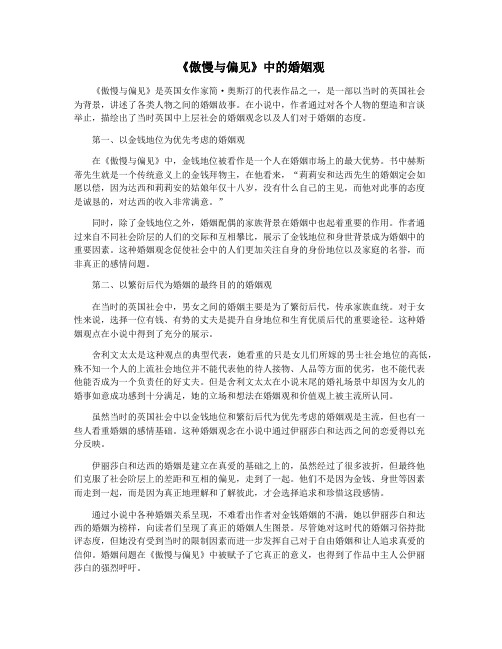
《傲慢与偏见》中的婚姻观《傲慢与偏见》是英国女作家简·奥斯汀的代表作品之一,是一部以当时的英国社会为背景,讲述了各类人物之间的婚姻故事。
在小说中,作者通过对各个人物的塑造和言谈举止,描绘出了当时英国中上层社会的婚姻观念以及人们对于婚姻的态度。
第一、以金钱地位为优先考虑的婚姻观在《傲慢与偏见》中,金钱地位被看作是一个人在婚姻市场上的最大优势。
书中赫斯蒂先生就是一个传统意义上的金钱拜物主,在他看来,“莉莉安和达西先生的婚姻定会如愿以偿,因为达西和莉莉安的姑娘年仅十八岁,没有什么自己的主见,而他对此事的态度是诚恳的,对达西的收入非常满意。
”同时,除了金钱地位之外,婚姻配偶的家族背景在婚姻中也起着重要的作用。
作者通过来自不同社会阶层的人们的交际和互相攀比,展示了金钱地位和身世背景成为婚姻中的重要因素。
这种婚姻观念促使社会中的人们更加关注自身的身份地位以及家庭的名誉,而非真正的感情问题。
第二、以繁衍后代为婚姻的最终目的的婚姻观在当时的英国社会中,男女之间的婚姻主要是为了繁衍后代,传承家族血统。
对于女性来说,选择一位有钱、有势的丈夫是提升自身地位和生育优质后代的重要途径。
这种婚姻观点在小说中得到了充分的展示。
舍利文太太是这种观点的典型代表,她看重的只是女儿们所嫁的男士社会地位的高低,殊不知一个人的上流社会地位并不能代表他的待人接物、人品等方面的优劣,也不能代表他能否成为一个负责任的好丈夫。
但是舍利文太太在小说末尾的婚礼场景中却因为女儿的婚事如意成功感到十分满足,她的立场和想法在婚姻观和价值观上被主流所认同。
虽然当时的英国社会中以金钱地位和繁衍后代为优先考虑的婚姻观是主流,但也有一些人看重婚姻的感情基础。
这种婚姻观念在小说中通过伊丽莎白和达西之间的恋爱得以充分反映。
伊丽莎白和达西的婚姻是建立在真爱的基础之上的,虽然经过了很多波折,但最终他们克服了社会阶层上的差距和互相的偏见,走到了一起。
他们不是因为金钱、身世等因素而走到一起,而是因为真正地理解和了解彼此,才会选择追求和珍惜这段感情。
简·奥斯丁婚姻观与当代女大学生恋爱观思考

简·奥斯丁婚姻观与当代女大学生恋爱观思考【摘要】简·奥斯丁是一位著名的英国小说家,她的作品以描写女性的婚姻和爱情为主题,深受读者喜爱。
当代女大学生的恋爱观快速发展,受到社会变迁和个人成长的影响。
本文通过对简·奥斯丁的婚姻观和当代女大学生的恋爱观进行比较和分析,探讨了二者之间的关系。
简·奥斯丁的婚姻观强调婚姻应该建立在相互尊重和理解的基础上,而当代女大学生则更加注重自身的独立和自主。
简·奥斯丁的婚姻观仍然有着一定的启示意义,可以帮助当代女大学生更好地理解和处理自己的恋爱关系。
结论部分总结了简·奥斯丁婚姻观的价值和当代女大学生恋爱观的发展趋势,展望了未来的发展方向。
【关键词】简·奥斯汀, 婚姻观, 当代女大学生, 恋爱观, 思考, 变迁, 影响, 借鉴, 价值, 发展趋势1. 引言1.1 简·奥斯汀及其作品简介简·奥斯汀(Jane Austen)是英国著名的小说家,她的作品以描绘社会生活和人性特征而闻名,被誉为“英国乡绅小说之母”。
简·奥斯汀出生于1775年,去世于1817年,短短42年的生命却留下了许多经典作品,如《傲慢与偏见》、《理智与情感》、《曼斯菲尔德庄园》等。
简·奥斯汀的作品常常描绘社会上层阶级的生活和爱情问题,她以幽默、细致的筆觸刻画出人物的性格和情感,展现出对社会现实的深刻洞察和对人性的深刻理解。
奥斯汀的小说情节曲折,对话风趣,擅长反映社会现实和揭示人性弱点,被誉为“英国文学史上最重要的女性作家之一”。
简·奥斯汀的作品深受读者喜爱,被认为具有跨越时空的普世价值,对后世的影响深远。
奥斯汀以其细腻的情感描写和对社会伦理的关注而著称,她的作品至今仍然备受推崇,为后人提供了丰富的思想启迪和情感共鸣。
1.2 当代女大学生恋爱观概况当代女大学生的恋爱观念在不断发生着变化,受到社会文化、经济发展以及个人成长经历的影响。
《理智与情感》中简奥斯汀的婚姻观
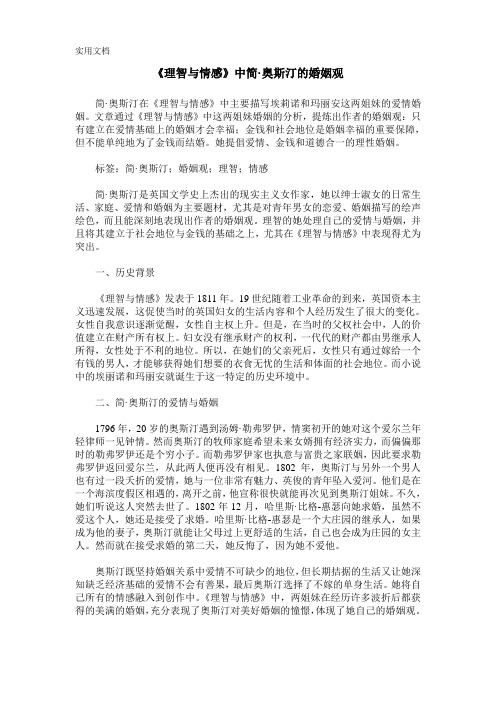
《理智与情感》中简·奥斯汀的婚姻观简·奥斯汀在《理智与情感》中主要描写埃莉诺和玛丽安这两姐妹的爱情婚姻。
文章通过《理智与情感》中这两姐妹婚姻的分析,提炼出作者的婚姻观:只有建立在爱情基础上的婚姻才会幸福;金钱和社会地位是婚姻幸福的重要保障,但不能单纯地为了金钱而结婚。
她提倡爱情、金钱和道德合一的理性婚姻。
标签:简·奥斯汀;婚姻观;理智;情感简·奥斯汀是英国文学史上杰出的现实主义女作家,她以绅士淑女的日常生活、家庭、爱情和婚姻为主要题材,尤其是对青年男女的恋爱、婚姻描写的绘声绘色,而且能深刻地表现出作者的婚姻观。
理智的她处理自己的爱情与婚姻,并且将其建立于社会地位与金钱的基础之上,尤其在《理智与情感》中表现得尤为突出。
一、历史背景《理智与情感》发表于1811年。
19世纪随着工业革命的到来,英国资本主义迅速发展,这促使当时的英国妇女的生活内容和个人经历发生了很大的变化。
女性自我意识逐渐觉醒,女性自主权上升。
但是,在当时的父权社会中,人的价值建立在财产所有权上。
妇女没有继承财产的权利,一代代的财产都由男继承人所得,女性处于不利的地位。
所以,在她们的父亲死后,女性只有通过嫁给一个有钱的男人,才能够获得她们想要的衣食无忧的生活和体面的社会地位。
而小说中的埃丽诺和玛丽安就诞生于这一特定的历史环境中。
二、简·奥斯汀的爱情与婚姻1796年,20岁的奥斯汀遇到汤姆·勒弗罗伊,情窦初开的她对这个爱尔兰年轻律师一见钟情。
然而奥斯汀的牧师家庭希望未来女婿拥有经济实力,而偏偏那时的勒弗罗伊还是个穷小子。
而勒弗罗伊家也执意与富贵之家联姻,因此要求勒弗罗伊返回爱尔兰,从此两人便再没有相见。
1802年,奥斯汀与另外一个男人也有过一段夭折的爱情,她与一位非常有魅力、英俊的青年坠入爱河。
他们是在一个海滨度假区相遇的,离开之前,他宣称很快就能再次见到奥斯汀姐妹。
不久,她们听说这人突然去世了。
论《傲慢与偏见》中奥斯丁的婚姻观
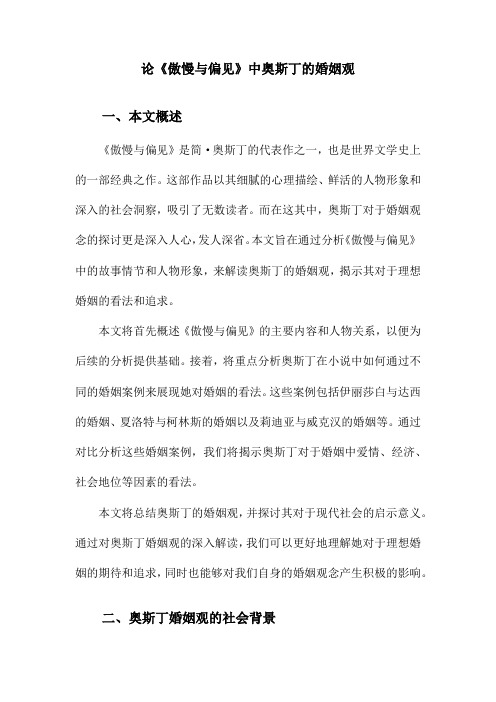
论《傲慢与偏见》中奥斯丁的婚姻观一、本文概述《傲慢与偏见》是简·奥斯丁的代表作之一,也是世界文学史上的一部经典之作。
这部作品以其细腻的心理描绘、鲜活的人物形象和深入的社会洞察,吸引了无数读者。
而在这其中,奥斯丁对于婚姻观念的探讨更是深入人心,发人深省。
本文旨在通过分析《傲慢与偏见》中的故事情节和人物形象,来解读奥斯丁的婚姻观,揭示其对于理想婚姻的看法和追求。
本文将首先概述《傲慢与偏见》的主要内容和人物关系,以便为后续的分析提供基础。
接着,将重点分析奥斯丁在小说中如何通过不同的婚姻案例来展现她对婚姻的看法。
这些案例包括伊丽莎白与达西的婚姻、夏洛特与柯林斯的婚姻以及莉迪亚与威克汉的婚姻等。
通过对比分析这些婚姻案例,我们将揭示奥斯丁对于婚姻中爱情、经济、社会地位等因素的看法。
本文将总结奥斯丁的婚姻观,并探讨其对于现代社会的启示意义。
通过对奥斯丁婚姻观的深入解读,我们可以更好地理解她对于理想婚姻的期待和追求,同时也能够对我们自身的婚姻观念产生积极的影响。
二、奥斯丁婚姻观的社会背景简·奥斯丁生活在18世纪末到19世纪初的英国,这一时期正值工业革命前夕,社会结构正在发生深刻的变化。
随着资本主义的兴起和城市化进程的加速,经济利益的地位日益上升,成为人们衡量一切价值的重要标准。
在这样的社会背景下,婚姻不再仅仅是情感的结合,更多地被看作是一种经济交易,一种社会地位的象征。
奥斯丁在《傲慢与偏见》中通过达西和伊丽莎白的爱情故事,对这种功利主义的婚姻观进行了深刻的批判。
达西最初因为伊丽莎白的出身和家世而对她抱有偏见,而伊丽莎白也因为达西的傲慢态度而对他心生反感。
然而,随着两人逐渐深入了解,他们发现彼此的性格和价值观才是决定婚姻幸福与否的关键因素。
奥斯丁的婚姻观深受当时社会的影响,但她也通过自己的作品表达了对这种功利主义婚姻观的不满和反思。
她认为,婚姻应该建立在相互尊重和理解的基础上,而不是仅仅为了追求经济利益或社会地位。
浅析 傲慢与偏见 中简奥斯汀的婚姻观
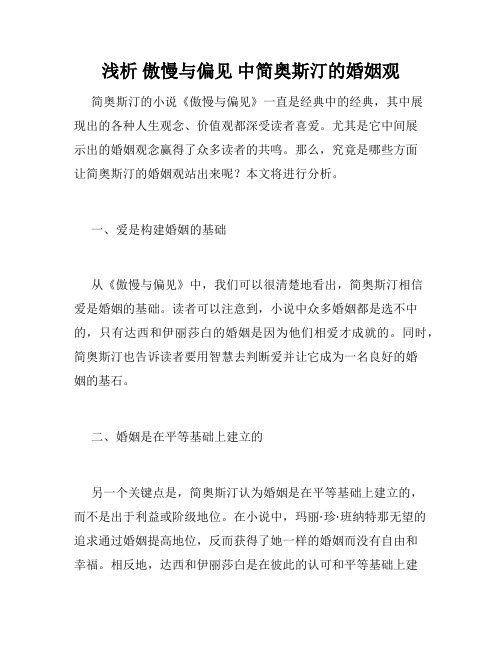
浅析傲慢与偏见中简奥斯汀的婚姻观简奥斯汀的小说《傲慢与偏见》一直是经典中的经典,其中展现出的各种人生观念、价值观都深受读者喜爱。
尤其是它中间展示出的婚姻观念赢得了众多读者的共鸣。
那么,究竟是哪些方面让简奥斯汀的婚姻观站出来呢?本文将进行分析。
一、爱是构建婚姻的基础从《傲慢与偏见》中,我们可以很清楚地看出,简奥斯汀相信爱是婚姻的基础。
读者可以注意到,小说中众多婚姻都是选不中的,只有达西和伊丽莎白的婚姻是因为他们相爱才成就的。
同时,简奥斯汀也告诉读者要用智慧去判断爱并让它成为一名良好的婚姻的基石。
二、婚姻是在平等基础上建立的另一个关键点是,简奥斯汀认为婚姻是在平等基础上建立的,而不是出于利益或阶级地位。
在小说中,玛丽·珍·班纳特那无望的追求通过婚姻提高地位,反而获得了她一样的婚姻而没有自由和幸福。
相反地,达西和伊丽莎白是在彼此的认可和平等基础上建立了婚姻。
这显示出简奥斯汀相信婚姻应该建立在内在,共同的价值观和道德准则基础上,而不是外在,虚荣的价值观。
三、婚前认知和理性思考在《傲慢与偏见》中,简奥斯汀在一些讲述中提醒读者必须要在婚姻中做出正确的选择,要在婚姻前进行丰富、深入的认知和理性思考。
例如,当吉英决定与维克姆先生结婚时,她没有充分认识到他的本性和行为以及他的不道德和骗局。
然而,对于伊丽莎白和达西来说,他们在相处过程中经历了变化,认知到他们都需要改变和扩大心灵,并最终认同了对方。
综上,简奥斯汀的《傲慢与偏见》所反映的婚姻观是人性真实,并且充满智慧和想象力。
简奥斯汀强调了爱、平等和对于定位的认知,本作品对于所有值得追求爱情和婚姻的人们提供了可喜的启示。
浅析《傲慢与偏见》中简奥斯汀的婚姻观

二、心灵之爱的婚姻
达西夫妇的婚姻是另一种类型的理想婚姻。他们的爱情是心灵之爱,这种爱 情是建立在互相理解、尊重和欣赏的基础上的。达西对伊丽莎白的爱不是一见钟 情,而是通过长时间的相处和交流逐渐产生的。他们的婚姻没有一见钟情的浪漫, 但是有着深厚的感情基础和相互支持。这种婚姻需要夫妻之间建立良好的沟通和 信任机制,才能保持稳定和幸福。
总的来说,《傲慢与偏见》是一部深入探讨婚姻、爱情和社会阶层的作品。 通过细腻的人物描绘和情节设计,奥斯汀向我们展示了她的婚姻观:她强调了感 情在婚姻中的重要性,揭示了社会阶层对婚姻的影响,同时也揭示了当时社会中 存在的婚姻观念的局限性。这部小说以其深刻的思想和情感,优美的语言和细腻 的描写,成为了世界文学史上的珍品。
在《傲慢与偏见》中,达西先生与其他人的关系充满了误解和冲突。然而, 正是这些误解和冲突,推动了他的性格发展和情感成长。在与伊丽莎白·班内特 的交往中,达西的傲慢和偏见让他误解了班内特一家的行为和态度。然而,随着 故事的深入,达西逐渐通过自我反思和行动,克服了他的傲慢与偏见,最终赢得 了伊丽莎白的爱情。
同时,简奥斯汀也通过达西的求婚过程,强调了婚姻中互相尊重和理解的重 要性。达西虽然出身高贵,但他的傲慢和自大使伊丽莎白对他产生了厌恶之情。 然而,在达西改变自己,学会尊重和理解伊丽莎白后,伊丽莎白最终答应了他的 求婚。这表明了简奥斯汀认为,婚姻中的伴侣应该尊重彼此的差异,并通过理解 和接纳这些差异来建立稳定和幸福的婚姻关系。
奥斯汀在《傲慢与偏见》中呈现的婚姻观,强调了理解、尊重和品行的重要 性。她认为,婚姻不应该仅仅是基于和品行的选择。这一点在达西的性格发展中得到了充分的体现。达西虽然在 开始时表现出了傲慢和偏见,但他最终能够克服这些缺点,以真实的自我赢得伊 丽莎白的爱情。这说明,奥斯汀认为,婚姻的选择应该是基于一个人内在的品质 和性格,而不是外在的地位和财富。
- 1、下载文档前请自行甄别文档内容的完整性,平台不提供额外的编辑、内容补充、找答案等附加服务。
- 2、"仅部分预览"的文档,不可在线预览部分如存在完整性等问题,可反馈申请退款(可完整预览的文档不适用该条件!)。
- 3、如文档侵犯您的权益,请联系客服反馈,我们会尽快为您处理(人工客服工作时间:9:00-18:30)。
Abstract: This paper first explores Jane Austen’s attitude toward marriage in Sense and Sensibility through her description of Elinor and Marianne, two heroines in the novel. It then discusses the contemporary influence of it. In the Regent period, the social status of women was low and the rights were not protected. With the awakening of female consciousness, these situations were improved to a great degree. Austin thinks that marriage requires love, however, in the society at that time, class is the first threshold, and marriage turned into equivalent commodities trading, women are treated as goods to be sold. Love is not quite a consideration when it comes to marriage. Austin abhors the commercial kind of marriage, advocating free and romantic love ,a breakthrough of the traditional view of marriage, maybe it can due to the advocating of the new ideas “liberty, equality, fraternity" .However, Austen is reserve and sensible, discussing how lacking of can affect people’s life. Marianne’s elastic love toward Willoughby can be detrimental to her reputation, and when she is dumped by him, she is completely desperate and broken. Austen shows her sarcastic and contemptuous attitude toward such behaviors. On the contrary, she appreciates Elinor’s character, reasonable while abounding in feelings. The conflicts between sense and sensibility make up the characters’ complex and contradictory personalities, arousing reader's interest and thinking, thus becoming an enduring topic. The ideas put forward by Jane Austen more than two hundred years ago are still instructive today. The contradictions between money and love, sense and sensibility is weakening, since people are paying more attention to the economic foundation and expecting more resonance of taste and emotion. It can hardly be denied that people of different classes will find it growingly difficult to produce this kind of resonance. Therefore, as long as we strike the balance of sense and sensibility, get rid of unrealistic fantasy and the idea of money worship, and build it on the basis of equality and mutual respect, a happy marriage may not be a utopian fantasy.Key words: sense, sensibility, attitude, marriage简•奥斯汀的婚姻观——以《理智与情感》为例摘要: 首先根据《理智与情感》原著,探究作者对埃莉诺与玛丽安两个女主人公感情和婚姻轨迹的描述,分析其背后奥斯汀对于婚姻的态度。
接着探讨奥斯汀的婚姻挂在当代具有的现实意义。
奥斯汀所处的英国摄政王时期,女性的地位低下,权利也得不到保障,然而,女性意识不断提高,使得这些情况有很大改善。
奥斯汀认为,婚姻需要双方的感情,在当时社会,门第阶层是第一门槛,婚姻演变成了对等的商品交易,女性被父母和家族当作商品一样估价而售,爱情似乎是人们最不齿的事情。
奥斯汀厌恶这种商业性质的婚姻,崇尚双方自由而浪漫的爱情,突破了英国传统的婚姻观,也许这离不开当时崇尚“自由,平等,博爱”的新思潮。
然而,奥斯汀同时又性格沉敛,充满理性,她在书中探讨了缺乏理性的感情的危害,玛丽安对威洛比不知收敛的表达爱意,引来旁人的猜疑,玷污了自己的名誉,同时还遭受了威洛比的抛弃,可以说表现了奥斯汀对盲目感情的讽刺和鄙夷,她认为应像埃莉诺一样,富有感情又充满理性。
奥斯汀的作品中,理智与情感互相角逐,彼此冲击,构成了人物复杂又矛盾的个性,引起读者思考,引发学者研究。
二百多年前简•奥斯汀所提出的观念到今天仍具有启发意义,爱情与面包,理智与情感的矛盾正在减弱,人们注重财富,同时也寄托于趣味和情感的共鸣,而不得不否认,不同阶层的人很难产生这种共鸣,所以只要平衡好理智与情感,抛开不切实际的臆想,摆脱拜金的理念,婚姻幸福可以不再是乌托邦式的构想。
关键词:理智,情感,婚姻,态度ContentsAcknowledgmentsAbstract1. Introduction1.1 Jane Austen’s Life Experience and Literature Achievements. (1)1.2 A Brief Introduction of Sense and Sensibility (3)2. Elinor’s and Marianne’s Attitude toward Marriage2.1 Elinor’s Personality and Attitude toward Marriage (5)2.1.1 Elinor’s Personality (5)2.1.2 Elinor’s Attitude toward Marriage (6)2.2 Marianne’s Personality and Attitude toward Marriage (6)2.2.1 Marianne’s Personality (6)2.2.2 Marianne’s Attitude toward Marriage (7)2.3 Jane Austen’s View on Elinor’s and Marianne’s Personalities and Marriages2.3.1 Jane Austen’s View on Elinor’s Personality and Marriage (9)2.3.2 Jane Austen’s View on Marianne’s Per sonality and Marriage (9)3. The Awakening of Female Consciousness in Jane Austen’s View on marriage3.1 The Feminist Views on Marriage in Sense and Sensibility (10)3.2 Current Influence of Jane Austen’s Attitude toward Marriage (11)4. Conclusion (11)References (13)Jane Austen’s Views on Marriage inSense and SensibilityI. IntroductionJane Austen is one of them most renowned female writers in British history,Sense andSensibility is the first published novel, from which we can learn her original views on marriage. Elinor is reserve and calm,Marianne, however, is enthusiastic, romantic and candid. Elinor is full of emotions and sympathies, while she learns to suppress them, a far cry from her mother and sister Marianne, who shows self-consciousness as she is full of vain fantasies on relationship and marriage. Marianne at first is obsessed with a fancy world but at last falls into reality, from which we can see that the author advocates women to use more sense when pursuing love and marriage.1.1 Jane Austen’s Life Experience and Literature Achievements.Jane Austen completed six novels in her lifetime: Sense and Sensibility, Pride and Prejudice, Mansfield Park, Emma, Northanger Abbey and Persuasion. Austen's works often discuss the relationship between love and economic security in a marriage. Austen gained her fame partly due to the historical and literary significance that she was the first female writers to write comic novels However, these books were published anonymously.Jane Austen grew up in an open and cheerful environment where the ideas of those with whom the Austens might disagree in political circles or social discourse were considered and discussed. Her father, George Austen was a rector. Though raised in a wealthy family, George's branch of the family was reduced into poverty. However, he still tried best to give Jane education and encouraged her to read and write. In her most lifetimes, Austen was home educated and lived her life in her immediate family environment. Austen showed keen interest in plays, most of them comedies, which explained how Austen's satirical talents were cultivated. According to Janet Todd, Austen wrote poems and stories to amuse herself and her family. In these works the details of daily life are exaggerated, common plot devices are parodied.When Austen was twenty, Tom Lefroy, a neighbor paid a visit to Steventon.It is obvious that Austen was attracted to him and they had a great time together. However, both Lefroy and Austen must have known that marriage was not possible between them for there are no benefits in this. Mr. Lefroy was an impecunious boy and the Jane’s family wanted his future son-in-law to be financially abundant. The first love was a failure, and Austin chose not to marry during her lifetime, and became dedicated to writing. As Austen considered about her relationship with Tom, If love can destroy o ne’s family, it will destroy itself in a long, slow degradation of guilt and regret and blame. All of her heroines gain happiness finally except herself. It is a pity while at the mean time an artistic coincidence, for Austen had been exploring the ideal marriage and striving hard to achieve the balance between love and marriage. Her own experience is indispensable to the analysis of her attitude toward marriage. It was Tom who encouraged her to follow her ideas in writing. Although they were not together, the relationship inspired her to become a professional writer.Jane Austen portrays common people in ordinary life. Her works reflect the life of the middle class in Britain at that time, showing the possibility of 'family' literature. She has explored the process of self-discovery of young heroine from love to marriage. Her effort to analyze the tension between the heroine and the society has made her novels free from the tradition of the eighteenth century and close to modern life. Her wit and humor, elegant words and clever plots make her novels popular in the world. In her narrow and limited circle of life, she observed and conceived with women's sensibilities, and was acclaimed by the famous British writer Scott as "the most acute observer of the British Regent period".In the perspective of Literature, Jane Austen had made great contributions. It is widely admitted that Austen's works critique the sentimental novels in late 18th century and plays an important role in the transition of literary realism in the 19th century. She showed resistance to sensationalism .According to critic Keymer, "Marianne in her sentimental histrionics responds to the calculating world with a quite justifiable scream of female distress."As Edmund Wilson wrote: there have been several revolutions of taste during the last century and a quarter of English literature, and through them all perhaps only two reputations have never been affected by the shifts of fashion: Shakespeare's and Jane Austen's. Austen, a renowned female writer in Britain as well as the word, enjoys great reputation, whose works are republished again and again and appreciated by millions of readers.1.2 A brief Introduction of Sense and SensibilitySense and Sensibility is the first published novel, from which we can learn her original views on marriage. It is about the story of Elinor and Marianne. They also have a little sister Margaret. The Dashwood sisters’ marriages reveal the trend of British society at that time that marriage was an exchange of econ omic and social status, while ignoring women’s rights. After their father Henry Dashwood’s death, the three Dashwood sisters and their mother are forced by their half-brother John and his wife Fanny to move away from Norland Park to Barton Cottage, near the home of her cousin, Sir John Middleton. They are welcomed into local society, where they also become acquainted with his friend, Colonel Brandon, his mother-in-law, the long-winded but well-intended Mrs. Jennings. Colonel Brandon is attracted by Marianne at the first sight, while Marianne does not feel a thing, as she considers the thirty-five-year-old colonel passionless and boring. When going out for a walk, Marianne breaks her ankles accidently. Out of pure coincidence, John Willoughby walks by and rescues her, carrying her back home. Later, Marianne is enthralled by his good appearance and similar tastes in poetry, music, and relationship. To her, he represents romance and everything. Therefore, they get close with each other and have several secret outings together. Elinor heard from Lucy of her secret four-year engagement to Edward Ferrars who Elinor fell in love with before she left Norland. Compounded with Edward’s listless countenance in his recent visit to Barton Cottage, Elinor is convinced that has no feelings any more. In their trip to London, Elinor and Marianne find that John Willoughby is engaged to a young lady, Miss Grey, who can inherit a large fortune. Colonel Brandon reveals to Marianne that Willoughby is a scoundrel .Marianne is frustrated; she walks in the rain and gets ill. After her recovery, Marianne realizes how stupid she has been to feel sorrow for Willoughby’s immoral, erratic, and inconsiderate behaviors, and then marries Colonel Brandon. When learning that Edward is not entitled to the family fortune, Lucy jilted him and throws herself to his wealthy brother Robert, so Edward and Elinor finally get married.The plot of the novel revolves around the love story of the heroine, revealing the social trends in Britain at the time, which is in order to marry, a woman often seeks for economic security, social status regardless of their own feelings and rights. In the novel, the heroine pursues equal communication with men's thoughts and feelings, demands equal rights insocial status, and insists on independent observation, analysis and selection of men's freedom. In Britain at the time, it was almost a cry of defiance.As the title suggests, the story focuses on the conflict between "sense" and "sensibility". John Dashwood is more rational than empathetic, Willoughby is also very hypocritical, seeming to be very emotional, but in fact, cold and ruthless. The author thinks highly of the feelings of people with praise, although her language seems ironic, but the lack of affection is treated with disdain. The author appreciates the heroine, Elinor, because she is affectionate and rational. Here is the author's ideal on this issue, which is, people can't have no feelings, but emotions should be controlled by reason.Through the analysis of the relationship between Marianne and Eleanor, the author reveals her own views on love and marriage, with profound feminist thoughts. She put heroines in the patriarchal society at that time, and explores the issue: in such a tough and demanding and often hostile world, how the heroine can achieve personal happiness in marriage? She believes that emotions are often a dangerous guide to women's behavior. Only good reason can protect us to the greatest extent.In Sense and Sensibility, irony is everywhere. This technique is applied not only in the comedy of the plot, but also in the overall structure of the story. Marianne is sure that colonel Brandon, old and frail, was "not entitled to think of marriage", but at last she marries him anyway. In Jane Austen's view, reality is such a prank, delightful in deriding the world's judgment, desire, and action.2. Elinor and Marianne’s Personality and Attitude toward marriage2.1 Elinor’s Personality and Attitude toward marriage2.1.1 Elinor’s PersonalityElinor represents sense and dispassion. She controls her own strong emotions, which seems indifferent or cold-hearted, which makes her become the counselor of her imprudent mother. Nineteen years old as she is, she is calm and mature. She is full of emotions and sympathies as well, while she learns to suppress them, a far cry from her mother and sister Marianne. As the author said ironically “it was a knowledge which her mother had yet to learn, and which one of her sisters had resolved never to be taught”.Elinor's concern with decorum reflects her understanding and coolness of judgment. Different from Marianne, Elinor's understands the world upon careful observation instead of personal emotions. Elinor criticizes Marianne for her selfishness as she has no control of her feelings, causing anyone around her to feel painful and heart-struck. Elinor behaves with relentless self-scrutiny and self-command, showing her considerate character for people she loves; this is very kind and thoughtful in that circumstance.2.1.2 E linor’s Attitude toward MarriageElinor has a crush on Edward Ferrars, Fanny's older brother, but she do not expect for Edward’s proposal. Edward, whose mother plans to get him into the parliament, bears the hope of making a fine figure in political concerns. If he fails her, he will probably be deprived of the rights to inherit his father’s property. When talking about her relationship with Edward, Elinor is sober and considers his responsibilities and obligations. She refuses to be blinded by love; instead, she behaves as calm as if she were an outsider.She is compassionate towards Colonel Brandon, his grave manner making her become more sympathetic for him. She is worried about the relationship between Marianne and Willoughby, and that Marianne is too reckless about obeying social conventions, which will finally, destroys her reputation.Elinor is the eldest daughter of her family, and the experience of her life makes her become sensible, calm and cautious. Her criteria for choosing a husband are not the person's appearance and economic condition, but the inner beauty. She was kind and gentle and always put herself in the shoes of other people's needs and happiness. When Marianne judges Edward of his spiritless and indifferent manner, deficiency in taste, Elinor defenses him by praising his sweet continence and amiable propensities. She is not a fan of dramatic love; instead, she adores someone that is respectable inside and comfortable to be with. Elinor's greatest concern is character. She likes Edward not at first sight, but because they are connected to each other. When she realizes that Edward’s secret engagement is the reason for his ambiguous attitude, she was very cautious and patient, though devastating inside, waiting for the situation to become clear.2.2 Marianne’s Personality and Attitude toward marriage2.2.1 Marianne’s PersonalityIn Austen’s own words“Marianne is sensible and clever,but eager in everything: her sorrows,her joys,could have no moderation.”As the representative of new female image, Marianne is flamboyant, brave to love and hate. She exudes intrepid, strong and persistent attitude no matter to the cynicism or to the pursuit of true love. A stark contrast to her sister, Marianne is enthusiastic, romantic and candid. She shows strong contempt to conventional rules and has romantic illusion toward love and passion. She is indulged in her own feelings, which have no restraints at all. Marianne gives no care to the patriarchal authority and in many cases even challenges such authority. She is forthright and never beat around the bush. When they are driven out by her half-brother John, Elinor acts calmly and explains to them that John is the only heir, Marianne asks ironically, “how can they be so cold?” Marianne treats her relative s and friends with inattention and sometimes, and spurn the secular rules, Marianne is creative and intelligent. She remarks Edward: for me there is something wanting, I’m not sure he really has a taste for poetry and paintings, and I’m sure he only praises Elinor’s drawings because they are hers. She detests clichés and anything boring and embraces passion and penetrable feelings.2.2.2 Marianne’s Attitude toward marriageShe always follows her own bent instead of yielding to other’s will. She gives no car e to other’s opinion. In terms of love, she is indulgent in her own fantasy and romantic imagination. In her defense, love can combat whatever difficulties that life can lay in store for them and lovers should act upon their feelings. When Marianne is rescued by the Willoughby, striking in figure and attracting in tastes, she falls deeply in love with him, giving no care to her sister's warnings that her impulsive behavior may engender gossip .She acts as she feels, thus making herself and everyone around her miserable when Willoughby dumps her, as opposed to her sister, who keeps the secret of Edward's prior engagement toa young lady with great fortune. .She is romantic and willful in relationship. She falls in love with Willoughby when he rescues her and carries her home after she breaks her ankle. His voice, his looks and tastes are the man she dreams of; therefore, she loves him at first sight. Even though Willoughby plays the fool with her feelings and leaves her ruthlessly, she still defends for him and let herself indulge in her own sorrow. She cannot eat nor sleep, tears ever-flowing, constantly playing or singing the music they both enjoy , or go out wandering alone. She gets badly ill and almost gets herself killed in despair. She never hides nor controls her feelings, just like her mother.Marianne declares that the marriage, which is arranged for benefits, is "not a marriage at all", "just a business transaction that both sides want to profit from.”Marianne is defined as a new woman in her secular and realistic characters, rather than a woman who puts morality first. In addition, when it comes to love, she shows self-conscious the as she bases vain fantasies on relationship and marriage. She is a young woman of flesh and blood. Through the arrangement of Mary's fate, the author reveals that women wholive solely on emotion are more vulnerable than those who live by sense and reason. Willoughby is the man who brings Marianne to a fancy world as well as a man who drops her into reality. The marriage market that is based on fortune draws young people to hunt trophies through marriage. Jane shares this lesson with common girls likeMarianne. Marianne learn self - control and sensible mind from Elinor with determination of changing personality. Moreover,Elinor also points out the importance of social status and money regards of marriage after Marianne’s recovery from sickness.In her reflection, Colonel Brandon is real in nobility,honest with friends,upright in morality,which Willoughby fails to be.Being secured by decent income and property in Dorsetshire,Marianne finds her happiness with awaken sense.Although she is well-accomplished with gifts,she is mentally withered and lost physical charms to catch man’s heart. The disadvantageous social environment n arrows down Marianne’s chance of finding another Prince,pushing her to drop romantic illusion and come to reality with common sense.One should take other issues into consideration like economic condition and social status,which serve a security for post-marriage life. The union of Marianne and Brandon is the manifestation of Jane Austen’s concept of a happy marriageHazel Jones does lots of researches on Jane Austen’s earlier attitudes towards a happy marriage whose solid foundation is a well-balanced condition between love and money. Either marriage merely for love or for money is not appreciated by Jane Austen.The representative of passion and sensibility Marianne gains common sense at last, and finally finds her own happiness.2.3 Jane Austen’s View on Elinor’s and Marianne’s Personalities and Marriages2.3.1 Jane Austen’s View on Elinor’s Personality and MarriageElinor's vision contains deep self-mockery. She is aware of her reduced situation, though she is not insatiable, she understands, that marriage is based on fortune. She shows understanding and sympathy to the wealthy bachelor Colonel Brandon and expects his union with her sister Marianne. According to a scholar, in Austen, marriage two themes intertwined at the heart of the events, that is property and propriety.Elinor may be the soberest person in Dashwood sisters, she in cautious in makingdecisions and considerate in social interaction. Different from Marianne, Margaret and their mother, Elinor in Austen’s depiction appears to be th e head of the family. However, she is full of feelings and emotions, which are appreciated by Austen in the acquisitive. One can tell that by exploring the character, Lucy, who is cunning and hypocrite compared with Elinor and Edward. Lucy may be the winner in the marriage market, while she loses the most valuable thing in a relationship----love.2.3.2 Jane Austen’s View on Marianne’s Personality and MarriageMarianne represents the typical emotionalist in late 18th century, and her desperation in love pe rhaps reflects Austin’s opposition and correction to this trend. Emotionalism pays attention to compassion, but more emphasis on the goodness of humanity and personal pursuit will almost inevitably lead to some kind of egoism, which deviates from its original intention to oppose greed and selfishness. If she followed the belief that personal feelings and emotions, she would fall into the mire of harming herself. As she later realizes, she cares too little about others, especially her sister and mother. She ignores social conventions and often shows contempt for others.Marianne puts her personal feelings and imagination in a high position, which results in the lack of reason and self-knowledge. She is too carried away by her romantic love to tell whether Willoughby is decent and reliable, thus leading to her frustration. From this, it is obvious that Austen disapprove Marianne’s sensibility and egotism, believing that emotions without restraints will bedevil women themselves.3. The wakening of female consci ousness in Jane Austen’s Views on Marriage3.1 The Feminist Views on Marriage in Sense and SensibilityAt that period, British women suffered from snobbery and discrimination in terms of writing and publishing works. Though thoughtful and intelligent, Austen cannot use her real name in her novels in a patriarchal society. Therefore, Austen’s works have a strong sense of self-consciousness and Feminism. Austen's plots highlight women's traditional dependence on marriage to secure social status and fortune. Through the trivialities of life, Austen emphasized women’s self-consciousness and individualism.On one hand, fortune can be found anywhere in this book and money plays an important role in marriage. Since women in that age have no right to inherit fortune, it is inevitable that women rely on men to get a better life. Money is the foundation of a happy marriage, even though there is no love and passion at first, like the relationship between Marianne and Colonel Brandon; they finally find a way to lead a happy life together.According to Doultaht, the theme of class is related to reputation. In that both reflect the strictly regimented nature of life for the middle and upper classes in the Regency England. Clinging to male was the choice of most women at that time. Therefore, women learnt all kinds of skills, making an air of confidence and elegance to attract males. Even though, the heroines of Austen are versatile and enjoy a great taste in literature, music and paintings. That is because Austen put grea t emphasis on women’s education, which is a kind of opportunity to free women out of the controls of men and the society, at least in the aspect of thought.On the other hand, Austin believes that women should get rid of the traditional mode ofmarriage, and marriage should be based on love. A woman can only marry a man whom she respects and admires. She thought that an elegant and knowledgeable woman was no longer in the traditional unfavorable position. Pure tolerance and recession cannot bring happiness in marriage. In a society where men have the right to choose his wives but women almost have no right to refuse a courtship, Austin's heroines often bravely choose their own husbands.Even so, Austen's heroine must bear the psychological and moral restraints of her time. Although they have shown in some ways Austen's feminist views, and have fully demonstrated their personalities. One can still tell the influence and restraints of the time.3.2Current Influence of Jane Austen’s Attitude toward MarriageThe Genesis told people that the woman is made of the rib taken out from the man. The doctrines of religious scriptures become the cultural core of female discrimination in the western countries. In Asia, there are still patriarchal thoughts prevalent in the past thousands of years. Women have long suffered from rules and principles of men out of ridiculous reasons. Jane Austen however creates Elizabeth, Emma, Elinor, Marianne and other intelligent heroines to persuade her readers to seek for more independence and self-consciousness in relationships and marriages.When Austen cast her eyes upon the squire and the lady, it is critical for us to see that there is a large number of women at the bottom of the society, whose lives are even more miserable, leaving them fewer choices in marriage. This also reveals the importance of women's knowledge, which is to reflect, criticize and doubt. From Jane Austen's feminist cries to postmodern feminism, the development of feminism has gone through a lot of hardships, but it is always moving forward.ConclusionIn this article, the personalities and attitudes of Elinor and Marianne, two heroines in Sense and Sensibility are analyzed. From their love and life experience, we can tell Jane Austen’s attitude toward marriage. Marianne suffers from her uncontrolled emotions and feelings. The lessons that Austen wants to convey have been explored and the contemporary influence has been discussed. However, there is needs solid proof that can further illuminate Austen’s contem porary significance for women.。
